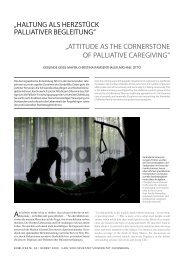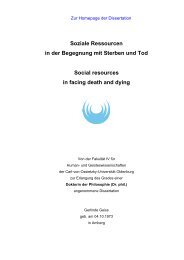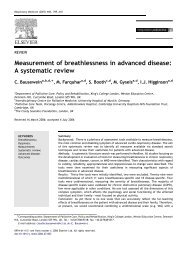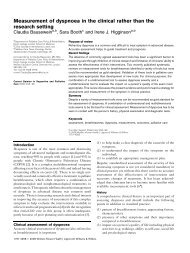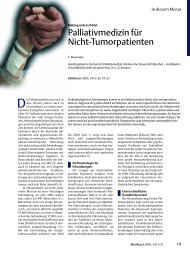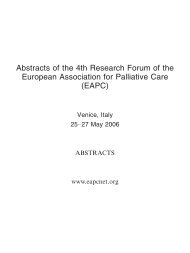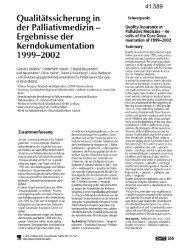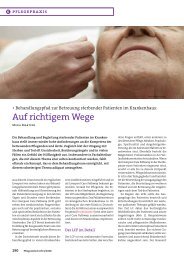EAPC - ipac
EAPC - ipac
EAPC - ipac
Create successful ePaper yourself
Turn your PDF publications into a flip-book with our unique Google optimized e-Paper software.
430 <strong>EAPC</strong> Abstracts<br />
102 Oral Presentation<br />
Research methodolgy and Audit<br />
Teleform Usage in Clinical Trials: Database Management<br />
Authors: Hue Quan Capital Health Regional Palliative Care Program Grey<br />
Nuns Community Hospital CANADA<br />
Carla Stiles Tom Baker Cancer Center Calgary CANADA<br />
Patricia Biondo Tom Baker Cancer Center Calgary CANADA<br />
Robin Fainsinger University of Alberta Edmonton CANADA<br />
Neil Hagen Tom Baker Cancer Centre and University of Calgary Calgary<br />
CANADA<br />
Dwight Moulin London Regional Health Sciences Center London, Ontario<br />
CANADA<br />
Background: Multicenter trials require data collection methods that accurately<br />
capture study information, while simultaneously minimizing workload<br />
for research staff. All research teams – investigators, sponsors and<br />
clinical research organizations – are concerned about fidelity of data collection,<br />
transfer and accuracy. Direct data entry can potentially address<br />
these concerns but further innovation is needed. Methods: Teleform<br />
(Verity Software Inc., Vista, CA) is an optical recognition-based technology<br />
that scans hand written data collection paper forms (quantitative and<br />
free text) and exports digitized data to a computer database. A multidisciplinary<br />
team converted hard copy data collection forms to teleform format<br />
for a multicentre trial focusing on sublingual methadone for the treatment<br />
of breakthrough pain. Each document was assigned a unique number and<br />
visual identifier to ensure form recognition, data organization and patient<br />
confidentiality. Sites used a teleform manual and individualized instruction<br />
to support form completion and transmission of data. Independent reviewers<br />
systematically evaluated submitted forms for missing data and inconsistencies.<br />
Free text entries were deciphered and transferred to the MS<br />
Access database. Queries were generated when necessary for clarification.<br />
Results: 300 completed forms have been submitted to the database. Health<br />
care providers and patients report that the format is easy to understand, and<br />
easy to complete. Data queries have been uncommon. Data integrity and<br />
patient confidentiality have been maintained. Conclusions: Teleforms support<br />
detailed collection, transfer and storage of study information, are feasible<br />
for both patient and professional data capture, and are financially<br />
modest to implement. This technology can support international clinical<br />
trials in palliative care, requiring little more than a fax machine from the<br />
sending centre. Funding: CIHR Grant PET69772 & Alberta Cancer Board<br />
High Risk Grant.<br />
103 Oral Presentation<br />
Research methodolgy and Audit<br />
Quality indicators for palliative care<br />
Authors: Anneke Francke NIVELNIVEL NETHERLANDS<br />
Roeline Pasman Department of Public and Occupational Health, EMGO-<br />
Institute, VU Medical Center Amsterdam NETHERLANDS<br />
Hella Brandt NIVEL Utrecht NETHERLANDS<br />
Luc Deliens Department of Public and Occupational Health, EMGO-<br />
Institute, VU Medical Center Amsterdam NETHERLANDS<br />
Riet Van Vliet IGZ Utrecht NETHERLANDS<br />
Background: Main aim of this study is to develop a set of quality indicators<br />
for palliative care that can be used in various settings (e.g. hospices, at<br />
home, hospitals, nursing homes). This 2-year project consists of five phases:<br />
(a) inventory of existing relevant quality indicators; (b) discussions with<br />
experts about which existent indicators are highly relevant and which indicators<br />
are being missed; (c) development of a draft set of quality indicators;<br />
(d) testing the set in various care settings; (f) making of the final version.<br />
The first phase already has been passed, and this presentation will mainly<br />
focus on the process and results of the inventory of existing indicators.<br />
Methods: Existing quality indicators were identified by searches in<br />
Medline, PsycINFO, EMBASE and CINAHL. Search terms regarding palliative<br />
care and quality indicators were combined. Only publications focusing<br />
on measurable quality indicators for palliative care were included. We<br />
considered an indicator “measurable” when a numerator, denominator or a<br />
performance standard was given. The inclusion process was performed by<br />
two reviewers independently. Results: The searches resulted in 580 potentially<br />
relevant references. Eleven of these 580 fulfilled the inclusion criteria.<br />
By reference tracking another 3 publications were identified. These<br />
14 publications concerned 6 sets of indicators: 2 concerning palliative cancer<br />
care, 1 concerning ICU end-of-life care, 1 concerning vulnerable elderly<br />
in end-of-life care, 1 concerning palliative nursing home patients, and<br />
1 concerning palliative care at home. In total about 100 (partly overlapping)<br />
indicators were found. The indicators covered all aspects of palliative care<br />
(physical, psychosocial and spiritual). Conclusions: The majority of the<br />
indicators concerned the process of palliative care; only a few are related to<br />
outcomes. In the next project phases choices have to be made regarding<br />
which quality indicators are most applicable and relevant for various palliative<br />
care settings.<br />
104 Oral Presentation<br />
Research methodolgy and Audit<br />
Views of patients and healthcare professionals towards RCTs in<br />
palliative care<br />
Authors: Clare White Palliative MedicineNorthern Ireland Hospice Care<br />
UNITED KINGDOM<br />
Kristen Gilshenan Mater Research Support Centre, Mater Health Services<br />
Brisbane AUSTRALIA<br />
Janet Hardy Director of Palliative Care, Mater Health Services Brisbane<br />
AUSTRALIA<br />
Background: Randomised controlled trials (RCTs) are notoriously difficult<br />
to complete in palliative care (PC). The study aimed to determine whether PC<br />
patients are interested in participating in RCTs, and identify important factors<br />
in their decision. It also considered the views of healthcare professionals<br />
(HCPs) through a parallel survey. Methods: Questionnaires were developed<br />
through literature review, a focus group of HCPs, and patient and relative<br />
interviews. Pilot studies were performed. The questionnaire for patients and<br />
HCPs assessed the same trial related factors, level of trial complexity, and<br />
tolerability of trial inconvenience. Ethical approval was obtained.<br />
Consecutive eligible PC patients were approached. The HCP survey was sent<br />
to 597 Australian and New Zealand HCPs. Results: 101 patients participated.<br />
Over 75% expressed altruistic views. 92% of patients would participate<br />
in studies involving simple interventions, whereas only 26% would consider<br />
studies of complex interventions. Financial burden and possibility of sideeffects<br />
was off-putting to many. Concepts of ‘randomisation’, ‘placebocontrol’<br />
and ‘blinding’ deterred approximately 50% of participants. Many<br />
were prepared to complete short questionnaires, accept extra medications,<br />
investigations, hospital visits or admissions within a trial context. 198 (33%)<br />
questionnaires were returned from HCPs. Very few would refer to complicated<br />
studies. Non-medical HCPs appeared less interested than doctors in<br />
studies involving randomisation, placebo or double-blind methodology. The<br />
majority would refer to non-pharmacological studies, but were less willing<br />
for studies with possible side-effects. Two factors predicted greater willingness<br />
to refer: previous research experience and male gender. Conclusions:<br />
Many patients are willing to participate in PC research if trial design is<br />
acceptable. Gatekeeping was an issue, with many HCPs unwilling to refer<br />
patients. This study should aid the development of RCTs in PC.<br />
105 Invited Lecture<br />
The complexity in the understanding and treatment of<br />
Depression in PC<br />
Adjustment disorder with depressed mood – how to differentiate<br />
from depression in palliative care patients<br />
Authors: Luigi Grassi Professore Ordinario di Psichiatria Università di<br />
Ferrara ITALY



